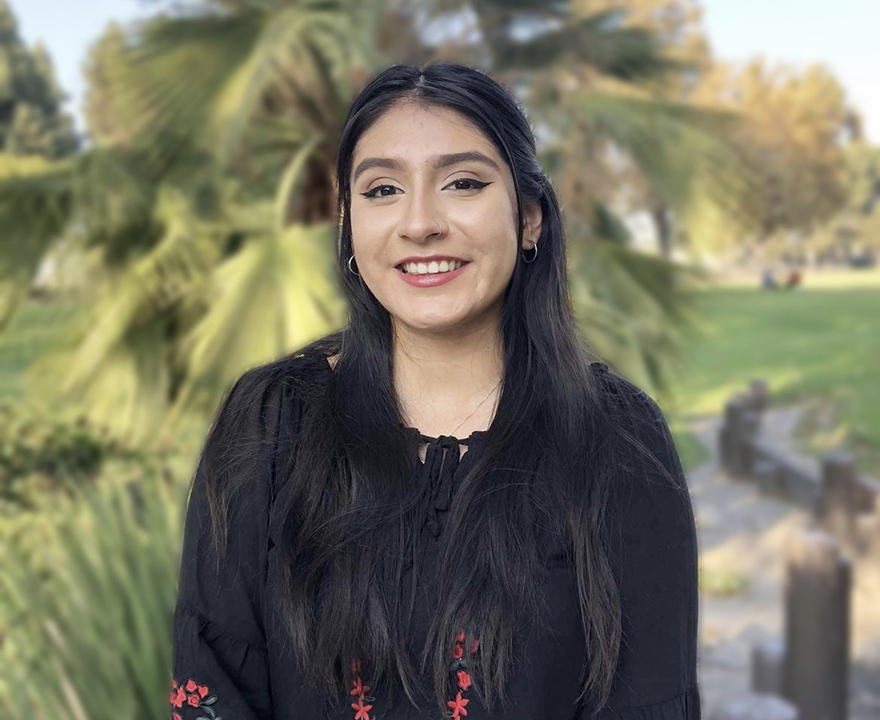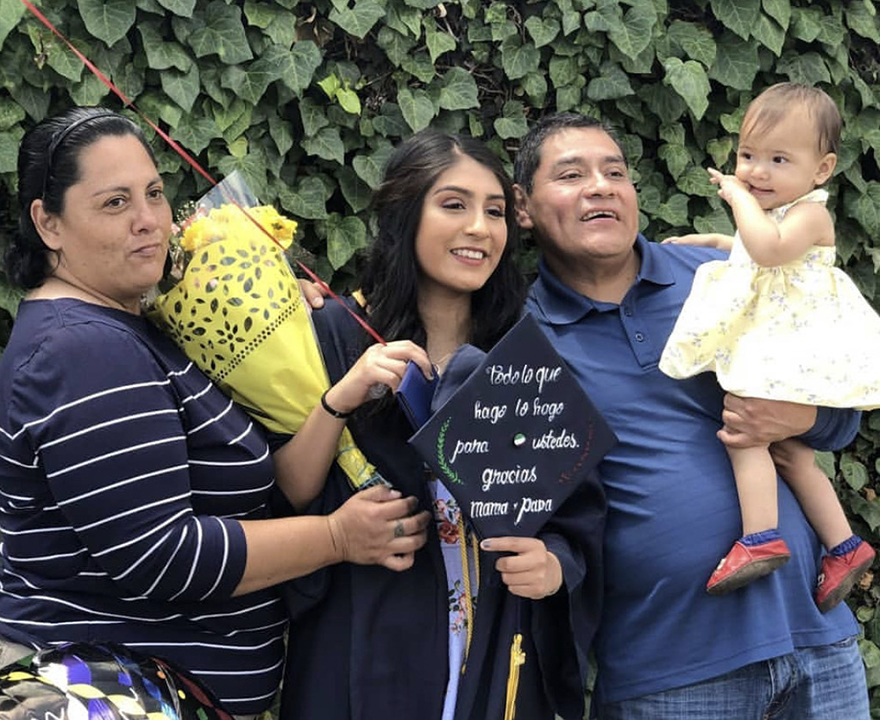Stepping into her power

Stepping into her power
- March 9, 2021
- First-generation sociology student Emily Yared Ramon finds a sense of belonging and UCI and shares it with others
-----
 Emily Yared Ramon spent her first months at UCI feeling friendless and alone. She
began to doubt if she even belonged. Ramon had even told her community college counselor
she didn’t think she was smart enough for a UC.
Emily Yared Ramon spent her first months at UCI feeling friendless and alone. She
began to doubt if she even belonged. Ramon had even told her community college counselor
she didn’t think she was smart enough for a UC.
“I was so scared,” says Ramon. “I had anxiety and stage fright about making presentations. I struggled with imposter syndrome.”
It’s hard to imagine the poised and confident young woman speaking over Zoom from her family’s home in Anaheim, California, having ever suffered from insecurity. Now in her final year at UCI as a sociology major, she is described as a “star student” by her faculty mentor, Jeanett Castellanos, associate dean of undergraduate studies in the School of Social Sciences.
Ramon mentors other first-generation students, co-leads a student organization, conducts undergraduate research, and is making plans to go to graduate school. Yet one of the first things she shares with the students she mentors is her story about struggles.
“I share my vulnerability, in order to connect,” says Ramon. “I show I struggle because we know we all go through it, and showing my vulnerability helps me build trust with my mentees.”
Inspiration and encouragement
Raised by parents who immigrated from Mexico, Ramon had always wanted to go to college and set an example for her two younger siblings. At community college, she took an introduction to sociology course and fell in love with the material.
“I realized they were talking about me, my community, and other communities of color,” Ramon says. “I really resonated with the material.”
Her Fullerton College counselor pushed Ramon to apply to UC campuses, and she chose UCI because it offered her the best financial aid package and was close enough to home to commute. Although she found the sociology department welcoming, she still felt uneasy.
Ramon joined the First-Generation First Quarter Challenge, a 10-week program that provides mentors and information to help students who are the first in their families to attend college to successfully navigate university life. In the program, Ramon’s student mentor encouraged her to meet with faculty for informational interviews, and even helped craft introductory emails. Thanks to this, Ramon met both Castellanos and Jessica Ortega, Ph.D., the coordinator and advisor for the Counseling Center’s COACH program.
“Meeting these two strong Latina figures really inspired me,” says Ramon. “Growing up, I never saw anyone who looked like me in leadership positions.”
The first time they met, Castellanos pulled out a piece of paper and drew a blueprint of what Ramon’s academic career at UCI might look like, and what steps she needed to take to prepare for graduate school.
“As my students ride the educational Freedom Train, they are taught to shape a dream, follow the dream, and ultimately live it out,” says Castellanos, who has mentored hundreds of UCI students through her two-decades of service on campus. “A graduate degree helps students build dreams that make positive impacts in society. In the shaping of tomorrow's doctors, lawyers, psychologists, professors, social workers, and teachers, the topic of a graduate degree is a priority to start moving the student toward seeing the vision and its promise.”
This advice made Ramon rethink her goals and reconsider what she was capable of achieving.
“Dr. C was the first one to truly see something in me that I never saw in myself,” says Ramon. “I’m the oldest in my family, and growing up, I never had any guidance or anyone I could look up to and turn to for education advice, so having someone who believed in me and thinks I’m capable of doing all these things …. It was amazing.”
“She pushed me to get out of my shell and echarle ganas [work hard],” Ramon adds.
Out of her comfort zone
Inspired to both expand and deepen her connections on campus, while making the most of her relatively short time at UCI as a transfer student, Ramon became an FGFQ student mentor and an intern at the Social Sciences Academic Resource Center. She participated in the Summer Academic Enrichment Program and became a student Life COACH. Many of these roles required her to offer advice and mentorship to other students, even as she was just figuring things out for herself.
“I’ve learned to go outside of my comfort zone and overcome my fears by doing those things that I fear,” says Ramon.
In her efforts to branch out and connect with more students, Ramon attended the student involvement fair where she stumbled upon the Latinx Student Psychological Association -- before realizing that Castellanos was the faculty advisor. Surrounded by other students with backgrounds and academic goals similar to hers, Ramon felt a sense of belonging.
“LSPA does a great job creating community and making people feel very comfortable and safe,” says Ramon, who is now co-president of the organization. One powerful component of the club is “Practice Familia” in which the students intentionally create a supportive, family-like environment to encourage each other’s academic achievements.
In fact, under Castellanos’ guidance, Ramon is currently leading a research project for the Undergraduate Research Opportunities Program to explore the effectiveness of “academic family” among graduate students.
She hopes to continue this research in graduate school, with a masters in educational counseling and eventually a doctorate.
“I’m very interested in education and breaking the cycle of generational trauma,” says Ramon. “Overcoming oppression makes you resilient, but generational trauma can also cause drug addiction, alcoholism and mental health problems that trouble certain families. I’m interested in how education can help break that cycle.”
Ramon aspires to work at a community college, guiding students from diverse backgrounds who, like her, are capable of achieving more than they may have imagined for themselves.
Castellanos sees this suiting Ramon quite well. “An advocate for social justice, Emily seeks opportunities to pass down college knowledge, to motivate and support younger generations, while teaching the power of the dream and its promise,” Castellanos says.
It’s a dream and promise that other Anteaters helped Ramon embrace for herself, and others.
“I would not be who I am if not for UCI,” she says. “I’m stepping into my power; stepping into who I am becoming.”
-Christine Byrd for UCI Social Sciences
-----
Would you like to get more involved with the social sciences? Email us at communications@socsci.uci.edu to connect.
Share on:
Related News Items
- Careet RightFirst-rate advice for first-year and first-generation Anteaters
- Careet RightBuilding bridges
- Careet RightUCI sociologists earn American Sociological Association honors, leadership roles
- Careet RightExploring educational pathways
- Careet RightMultiple honors for UCI soc sci's Maricela Bañuelos


